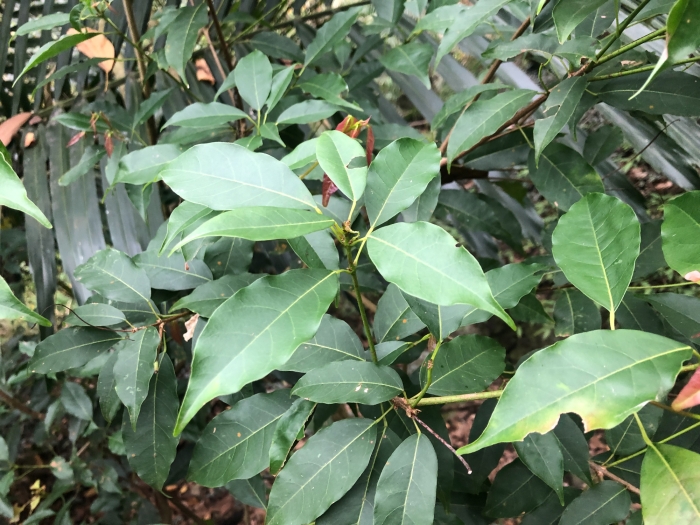Himalayan Maple
(Acer oblongum)
Himalayan Maple (Acer oblongum)
/
/

Cheng-Tao Lin
CC BY 4.0
Image By:
Cheng-Tao Lin
Recorded By:
Copyright:
CC BY 4.0
Copyright Notice:
Photo by: Cheng-Tao Lin | License Type: CC BY 4.0 | License URL: http://creativecommons.org/licenses/by/4.0/ | Rights Holder: Cheng-Tao Lin | Publisher: iNaturalist | Date Created: 2020-04-26T15:23:38-07:00 |


















Estimated Native Range
Summary
Acer oblongum, commonly known as Himalayan Maple, is an evergreen or semi-deciduous tree native to the montane temperate forests and mixed broadleaf-coniferous woodlands ofthe Himalayas, Southeast Asia, Eastern Asia. It typically reaches a height of 15–22 meters (49–72 ft) with a broad crown. The Himalayan Maple is notable for its ability to retain green foliage throughout winter in milder climates, which is atypical for maples. The bark of the tree is smooth to wrinkled, providing textural interest, and the trunks often exhibit buttressing. Its flowers are small, hermaphroditic, and inconspicuous, measuring about 4 mm, with a greenish-white coloration and gathered in hairy racemes. Flowering occurs in spring, but the flowers are not particularly showy. The fruits are the characteristic two-winged samaras, approximately 2.5 cm long, which are wind dispersed in late summer to fall.
The Himalayan Maple is valued for its evergreen or semi-deciduous nature, providing year-round interest in large gardens and parks. It is also appreciated for its wood. This species is adaptable to a range of soil types, from slow to fast drainage, and prefers full sun to partial shade. While it requires medium amounts of water, established trees can tolerate some drought. It is not commonly known for serious disease or pest issues, but proper spacing and site selection can minimize potential problems. Due to its size and root system, it is best suited for spacious landscapes rather than small gardens or urban areas where space is limited.CC BY-SA 4.0
The Himalayan Maple is valued for its evergreen or semi-deciduous nature, providing year-round interest in large gardens and parks. It is also appreciated for its wood. This species is adaptable to a range of soil types, from slow to fast drainage, and prefers full sun to partial shade. While it requires medium amounts of water, established trees can tolerate some drought. It is not commonly known for serious disease or pest issues, but proper spacing and site selection can minimize potential problems. Due to its size and root system, it is best suited for spacious landscapes rather than small gardens or urban areas where space is limited.CC BY-SA 4.0
Plant Description
- Plant Type: Tree
- Height: 20-30 feet
- Width: 20-30 feet
- Growth Rate: Moderate
- Flower Color: N/A
- Flowering Season: Spring
- Leaf Retention: Evergreen
Growth Requirements
- Sun: Full Sun, Part Shade
- Water: Medium
- Drainage: Slow, Medium, Fast
Common Uses
Bee Garden, Bird Garden, Butterfly Garden, Low Maintenance
Natural Habitat
native to the montane temperate forests and mixed broadleaf-coniferous woodlands ofthe Himalayas, Southeast Asia, Eastern Asia
Other Names
Common Names: Evergreen Maple, Kashmir Maple, Flying Mothtree
Scientific Names: , Acer oblongum, Acer oblongum f. concolor, Acer oblongum var. itoanum, Acer itoanum, Acer buergerianum var. formosanum, Acer oblongum f. glaucum, Acer oblongum var. concolor, Acer trifidum var. formosanum, Acer guanense
GBIF Accepted Name: Acer oblongum Wall. ex DC.